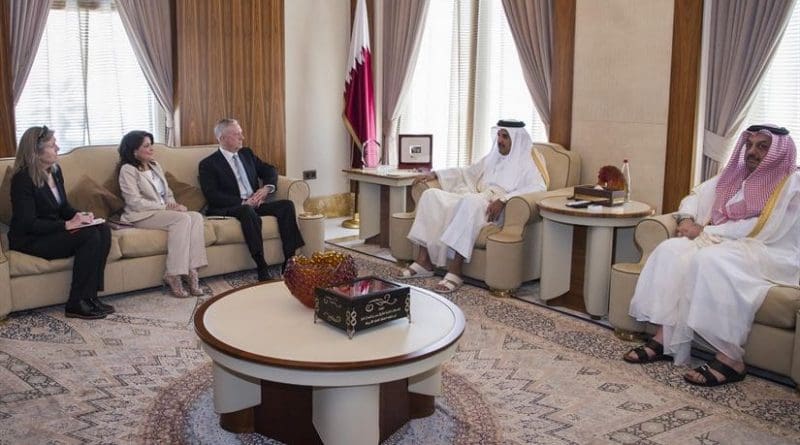Qatar Row Is No Passing Cloud – OpEd
By Arab News
By Abdulrahman Al-Rashed*
Political rows between countries happen every now and then. But in Qatar’s case, the disputes have proved enduring, harmful and inexcusable.
The disagreements were for a time viewed as fleeting and as short-lived inconveniences. But with over 20 years of not seeing eye-to-eye, Doha’s destructive policies grew inescapably consistent.
The first tangible difference took place in 1990 — the year Kuwait was invaded, uprooting at least a million citizens and residents and sending its government to exile.
Given that Kuwait is a key member of the Gulf Cooperation Council (GCC), regional leaders convened in the Qatari capital, Doha, for a summit devoted to freeing the GCC state from Iraqi aggression.
The then heir apparent of Qatar, Sheikh Hamad bin Khalifa Al-Thani, shocked Gulf leaders by leading discussions away from freeing Kuwait, and giving priority to a Doha-Bahrain quarrel over ownership of the Hawar Islands — which paled in comparison with Kuwait’s predicament at the time.
Gulf leaders, particularly the late Saudi King Fahd (may his soul rest in peace), were infuriated by the apparent conceit shown by the Qatari party to advance personal agendas at such a critical time.
King Fahd threatened Sheikh Hamad with withdrawing from the summit, and so did the rest of the GCC leaders.
From that day onward, Qatar’s rifts with everyone never ended.
They only worsened when Sheikh Hamad overthrew his father in bloodless palace coup d’état in 1995, and later appointed his son Sheikh Tamim bin Hamad Al-Thani, the current emir of Qatar. Two decades worth of Sheikh Hamad policies have fed disagreement and undermined Gulf unity.
Doha increasingly began to be a backdoor to the region by playing host to Saudi Arabia’s enemies. It took in protesters who wanted coercive regime change, and sponsored the alliance between Iran, the Lebanon-based Hezbollah and Syria’s regime head Bashar Assad for a whole 10 years.
Qatar’s provocations left it at odds with most regional states. And in response to its exceedingly dangerous behavior, several major Arab countries have finally decided to sever diplomatic relations with Qatar. Saudi Arabia, the UAE, Egypt and Bahrain announced on Monday they were cutting all land, maritime and transport ties with Qatar.
The decision was not based on the long record of dispute, but a conviction of there being no hope in changing the irreversible course the Doha authorities have set out on.
The fights Qatar is picking are juvenile, but also very risky.
Doha’s continued funding of organizations, individuals, media channels and social media networks that are blatantly campaigning for violent anti-government movements has only destabilized the region.
Qatar has presented itself as an ally to groups like the Muslim Brotherhood (MB), which is on a constant quest to establish a self-styled religious ruling system, resembling Iran’s theocracy. Despite the MB’s failures in Palestine, Egypt, Libya and Yemen, it resumed the agenda of spreading chaos across the region.
The final nail in the coffin of the Gulf-Qatar friendship was struck last week, when the Doha state-owned media agency carried a statement allegedly by Sheikh Tamim that apparently saw him endorse Iran, Hamas and Hezbollah.
Among Qatar’s most dangerous ploys is that which is being played out in Bahrain, where it has not stopped funding both armed and peaceful oppositions. Yet its pitch to overthrow Bahrain’s government remains a failure.
On the other hand, Doha’s investment in disrupting Lebanon received better results, where it frankly supported the Assad regime and Iran proxy Hezbollah during their assassination campaigns against Lebanese leaders and occupation of West Beirut. Until this very day, Hezbollah and its allies maintain the upper hand in Lebanon.
Taking things a step further, Doha recently embarked on reviving communications with Iran, an arch foe of the Gulf countries.
As for its endgame in Bahrain, Qatar might be deluded into believing that toppling the regime would play out positively for its expansionist ambitions. The same is evident with its attempt to spur chaos in Saudi Arabia, another neighboring state.
Qatar is apparently willing to go to great extremes in doing everything and supporting everyone without distinction. It backs religious extremist groups, Arab fascists and nationalist parties and leftist groups.
Paradoxically, while it hosts one of the largest US military bases in the region, Qatar did not hesitate in broadcasting videotapes in which Al-Qaeda leaders Osama bin Laden and Ayman Al-Zawahiri openly called for American bloodshed. It is worth noting that US operations against Afghanistan and Iraq are launched from this base.
Qatar also funds paramilitary militias that attack American troops in Iraq.
Taking into consideration all of Qatar’s irrational policies, it is clear that the logic behind Doha’s decision-making is impossible to grasp, and arriving at a truce with its government impossible.
During what is perceived as a critical time, Doha’s approach threatens to dismantle the last of whatever stability the Middle East has known since World War II.
The methods adopted by Qatari authorities are nothing short of delirious — in what could loosely be termed as a “nut job” approach taken by Doha.
• Abdulrahman Al-Rashed is a veteran columnist. He is the former general manager of Al Arabiya News Channel, and former editor-in-chief of Asharq Al-Awsat, where this article was originally published.

